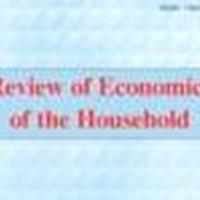A new article by Dr Maria Porter on 'Review of Economics of the Household' examines how imbalanced sex ratios influence marriage decisions and household bargaining. Using data from the 1982 Chinese census, the traditional “availability ratio” is modified to reflect the degree to which men tend to marry women from different cohorts. This ratio reflects the average tendency of men to prefer women who are close in age to women who are several years younger than them by weighting cohort sizes using the proportion of people in the population who marry someone born in a different cohort. Given that men generally marry younger women, this ratio varies independently of the size of one’s own birth cohort. Yet, the ratio fluctuates considerably across individuals, as the sizes of birth cohorts in China vary across time and regions. This enables us to examine how variability in such ratios may influence marriage decisions and household bargaining. The findings suggest that women exercise greater bargaining power once married. Results indicate that as women become scarcer in the marriage market, they have healthier sons. Men also delay marriage, and consume less tobacco and alcohol. This paper also highlights how sensitive findings may be to using this modified weighted availability ratio rather than a traditional unweighted availability ratio.
News











.svg_square_xs.jpg)